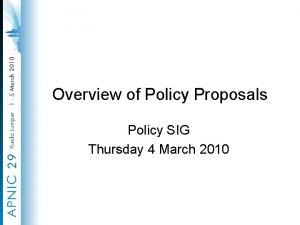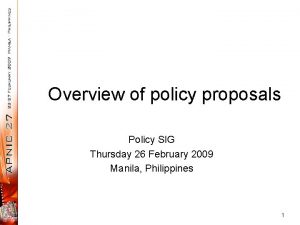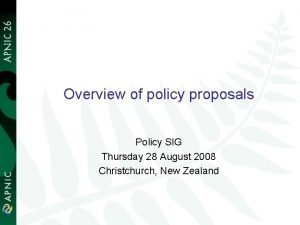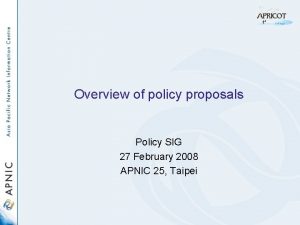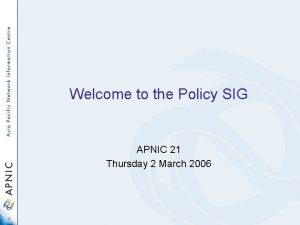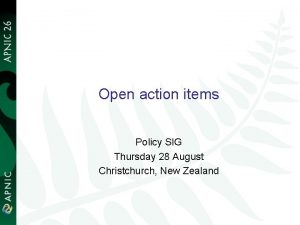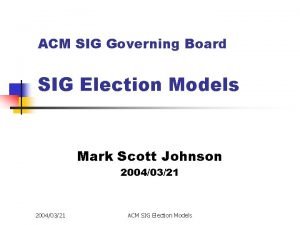Overview of Policy Proposals Policy SIG Thursday 4

















- Slides: 17

Overview of Policy Proposals Policy SIG Thursday 4 March 2010

Proposals under Discussion • Prop-077: Proposal to supplement transfer policy of historical IPv 4 addresses • Prop-078: IPv 6 deployment criteria for IPv 4 final /8 delegations • Prop-079: Abuse contact information • Prop-080: Removal of IPv 4 prefix exchange policy • Prop-081: Eligibility for assignments from the final /8 • Prop-082: Removing aggregation criteria for IPv 6 initial allocations • Prop-083: Alternative criteria for subsequent IPv 6 allocations

Prop-077: Proposal to supplement transfer policy of historical IPv 4 addresses Problems this proposal aims to address: • Historical IPv 4 transfer policy was designed to encourage address holders with no relationship with APNIC to bring their historical resources into the current policy framework. • But new policy for transfer of current space (was Prop-050) and allocations direct from APNIC require justification.

Prop-077: Proposal to supplement transfer policy of historical IPv 4 addresses Proposed solution: • Recipients of historical IPv 4 address transfers must justify the need for those resources according to: – Prop-050 justification criteria OR – existing IPv 4 allocation criteria (if transfer policy for current IPv 4 addresses not adopted)

Prop-077: Proposal to supplement transfer policy of historical IPv 4 addresses • Returned to authors for further consideration – Authors deferring further action on this proposal pending experience with new policy for transfers between APNIC account holders (was Prop-050).

Prop-078: IPv 6 deployment criteria for IPv 4 final /8 delegations Problem this proposal aims to address: • Allocations from the “final /8” may be used to without restriction other than justification, and recipients are not required to prepare for transition to IPv 6

Prop-078: IPv 6 deployment criteria for IPv 4 final /8 delegations Proposed solution: • To get space from the final /8: • The account holder must demonstrate either: – an IPv 6 transition plan, OR – IPv 6 deployment needs, especially the needs for IPv 6 to IPv 4 internetworking. • The account holder must have either: – existing IPv 6 addresses, OR – a valid application for IPv 6 addresses.

Prop-079: Abuse contact information Problem this proposal aims to address: • There is no formal, consistent way to provide details in the APNIC whois Database of where to send abuse reports.

Prop-079: Abuse contact information Proposed solution: • • • Make it mandatory to include a reference to an IRT object in inetnum, inet 6 num and autnum objects. Have a mandatory abuse-mailbox field in the IRT object. Delete abuse-mailbox fields in all objects without IRT and delete the trouble field everywhere starting 2011.

Prop-080: Removal of IPv 4 prefix exchange policy Problem this proposal aims to address: • Under the historical prefix exchange policy, networks can exchange three or more noncontiguous prefixes for a single larger prefix without having to justify use of the addresses. • In the lead-up to IPv 4 exhaustion, it will become harder and harder to find large enough unallocated blocks to swap for the noncontiguous blocks.

Prop-080: Removal of IPv 4 prefix exchange policy Proposed solution: • Remove the historical prefix exchange policy.

Prop-081: Eligibility for assignments from the final /8 Problem this proposal aims to address: • Under the current final /8 policy, only allocations can be made, i. e. space for LIRs to further delegate to customers • No assignments can be made, i. e. space for end sites, IXen, critical infrastructure

Prop-081: Eligibility for assignments from the final /8 Proposed solution: • • Allow each account holder receive one assignment under the final /8 policy. If an account holder already has an allocation from the final /8, the account holder is not eligible for an assignment.

Prop-082: Removing aggregation criteria for IPv 6 initial allocations Problem this proposal aims to address: • The initial IPv 6 address allocation criteria requires that LIRs aggregate their block, but the new kickstart policy does not require aggregation, nor does the subsequent allocation criteria.

Prop-082: Removing aggregation criteria for IPv 6 initial allocations Proposed solution: • Remove the requirement to aggregate initial IPv 6 allocations.

Prop-083: Alternative criteria for subsequent IPv 6 allocations Problem this proposal aims to address: • An APNIC account holder with an existing /32 IPv 6 allocation (or larger) is unable to deaggregate that allocation into routes smaller than a /32 due to the community practice of 'filter blocking' or 'bogon lists' associated with RIR blocks which are known to have a minimum allocation size of /32. • This prevents an LIR wanting to build a network in separate locations and provide IPv 6 connectivity to deaggregate their initial /32 allocation for this purpose.

Prop-083: Alternative criteria for subsequent IPv 6 allocations Proposed solution: • Permit current APNIC account holders with networks in multiple locations but without a connecting infrastructure to obtain IPv 6 resources for each location.
 Artificial intelligence thesis proposals
Artificial intelligence thesis proposals Developing effective research proposals
Developing effective research proposals Writing and completing reports and proposals
Writing and completing reports and proposals Both internal and external proposals are
Both internal and external proposals are Eclipse computing proposals slow
Eclipse computing proposals slow Writing and completing reports and proposals
Writing and completing reports and proposals Nature and use of fire insurance
Nature and use of fire insurance Delhi muslim proposals
Delhi muslim proposals Difference between formal and informal proposals
Difference between formal and informal proposals Capital investment decision
Capital investment decision Writing thesis and dissertation proposals
Writing thesis and dissertation proposals Thursday question of the day
Thursday question of the day Last supper devotional
Last supper devotional Arvolan karjapiha
Arvolan karjapiha Thursday to saturday
Thursday to saturday Eugene kelly colgate
Eugene kelly colgate Thursday bell ringers
Thursday bell ringers Happy easter tradition
Happy easter tradition


















